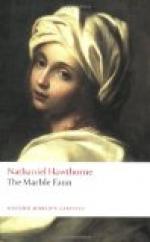“What a magic is in mist and vapor among the mountains!” he exclaimed. “With their help, one single scene becomes a thousand. The cloud scenery gives such variety to a hilly landscape that it would be worth while to journalize its aspect from hour to hour. A cloud, however,—as I have myself experienced,—is apt to grow solid and as heavy as a stone the instant that you take in hand to describe it, But, in my own heart, I have found great use in clouds. Such silvery ones as those to the northward, for example, have often suggested sculpturesque groups, figures, and attitudes; they are especially rich in attitudes of living repose, which a sculptor only hits upon by the rarest good fortune. When I go back to my dear native land, the clouds along the horizon will be my only gallery of art!”
“I can see cloud shapes, too,” said Donatello; “yonder is one that shifts strangely; it has been like people whom I knew. And now, if I watch it a little longer, it will take the figure of a monk reclining, with his cowl about his head and drawn partly over his face, and—well! did I not tell you so?”
“I think,” remarked Kenyon, “we can hardly be gazing at the same cloud. What I behold is a reclining figure, to be sure, but feminine, and with a despondent air, wonderfully well expressed in the wavering outline from head to foot. It moves my very heart by something indefinable that it suggests.”
“I see the figure, and almost the face,” said the Count; adding, in a lower voice, “It is Miriam’s!”
“No, not Miriam’s,” answered the sculptor. While the two gazers thus found their own reminiscences and presentiments floating among the clouds, the day drew to its close, and now showed them the fair spectacle of an Italian sunset. The sky was soft and bright, but not so gorgeous as Kenyon had seen it, a thousand times, in America; for there the western sky is wont to be set aflame with breadths and depths of color with which poets seek in vain to dye their verses, and which painters never dare to copy. As beheld from the tower of Monte Beni, the scene was tenderly magnificent, with mild gradations of hue and a lavish outpouring of gold, but rather such gold as we see on the leaf of a bright flower than the burnished glow of metal from the mine. Or, if metallic, it looked airy and unsubstantial, like the glorified dreams of an alchemist. And speedily—more speedily than in our own clime—came the twilight, and, brightening through its gray transparency, the stars.
A swarm of minute insects that had been hovering all day round the battlements were now swept away by the freshness of a rising breeze. The two owls in the chamber beneath Donatello’s uttered their soft melancholy cry,—which, with national avoidance of harsh sounds, Italian owls substitute for the hoot of their kindred in other countries,—and flew darkling forth among the shrubbery. A convent bell rang out near at hand, and was not only echoed among the hills, but answered by another bell, and still another, which doubtless had farther and farther responses, at various distances along the valley; for, like the English drumbeat around the globe, there is a chain of convent bells from end to end, and crosswise, and in all possible directions over priest-ridden Italy.




